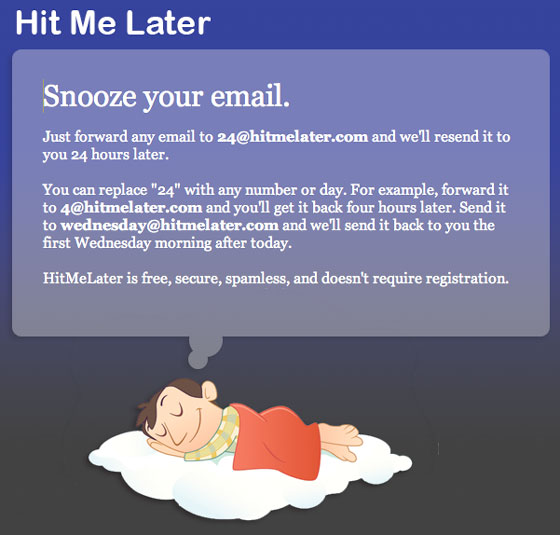 For most of us, Gmail can be the simple answer to aggregating all of our emails together in one place. But for those who are looking for something new with a bit more spice, there are a whole new breed of email aggregators that promise to redefine the way we look at and use our inboxes. Here are 6 online email aggregators that do more than just aggregate.
For most of us, Gmail can be the simple answer to aggregating all of our emails together in one place. But for those who are looking for something new with a bit more spice, there are a whole new breed of email aggregators that promise to redefine the way we look at and use our inboxes. Here are 6 online email aggregators that do more than just aggregate.
Zenbe

Zenbe, “designed to be the world’s best email experience,” is the coolest new kid on the block and might just emerge as the big guy soon enough. The advertisement-free service offers you an email program, startup page, calendar, files directory, task list, your Facebook updates, Twitter, a chat application, Delicious, and address book all in one place. While you might be getting many of these features in other email programs, the presentation and flawless execution is what make Zenbe a clear winner.
The calendar, startup page, file directory, and email come in tabs in the center of the page. There is a right-hand sidebar that executes the Twitter, Facebook, chat and to-do list applications. Zenbe can get your emails from other email services like Gmail, AOL, Yahoo, and MSN using POP. What I particularly like about Zenbe is the start-up page titled “ZenPage” that will definitely change the way we look at emails and start-up pages. You can have members at your ZenPage and chat with them live from your account.
Orgoo
Orgoo is similar to Zenbe but in a much simpler form. If you take away Zenbe’s ZenPage, Facebook, Twitter, and a few other features, you are left with Orgoo. The service provides you with an inbox and a chat application on the right-hand sidebar, and aggregates your SMS messages, but what is really striking about Orgoo is its video chat feature. Orgoo’s video chat allows you to use any webcam and start chatting from your account page.
Fuser

Fuser, as the name suggests, simply fuses all your email accounts, including AIM, AOL, Comcast, POP3, IMAP, Gmail, Hotmail, Live, Netscape, Outlook, Yahoo, and more, in one place. Not only that, you can also get and reply to your MySpace, Facebook, and Twitter messages from the Fuser inbox.
TopicR

TopicR is not really about aggregating your emails from all of your other email addresses, but experiencing a whole new way of using email while still retaining your old email addresses. I can bet some of the features in TopicR will make you say “wow.” With TopicR you can send private emails that can’t be forwarded or copied. It also acts a file upload service where you can upload a number of pictures or audio files that your recipients can see online so that their inboxes don’t get clogged. You can mix music and pictures in your attachments and create a slide show. You can also create an RSS feed of your email.
TopicRacts as a social networking platform where you can browse through the publicly shared content and connect with other readers. What I find particularly interesting is the Activity Stream, which in TopicR’s words is “the stream of people’s activities around your email topics and contents.” Talk about the next generation of email - this could be close.
Goowy

Goowy is for the Flash fans out there. It provides you a Flash based webtop that includes features like email, calendar, contact management, a startup page, IM, file storage, and more. You can add your Gmail, Yahoo, and Hotmail accounts into Goowy using POP3. There are plenty of customization options that you can choose from, including dozens of inbox skins.
Jubii

Jubii not only aggregates your different email accounts but acts as a smart service that adapts according to your usage patterns. For example, it sorts out your incoming emails into your private and public inboxes and highlights important senders. It provides a file storage center with a 10 GB space for the first 1 million beta users and 4 GB per user thereafter that you can use to store any type of files and share easily with your contacts.
Jubii also acts like a social networking platform where you can see who is online and connect with them in real time. Instead of emailing, you can choose to call your contacts on landline and mobile phones using the service. The following countries are supported currently for the online telephony service: US, Austria, Canada, Denmark, France, Germany, Italy, Netherlands, Spain, and United Kingdom. Jubii currently allows you to call and talk your contacts for 30 minutes a day or 3 hours per month for free. Jubii also provides an RSS feed reader feature that you might want to check out.
Courtesy of Mashable



 For most of us, Gmail can be the simple answer to aggregating all of our emails together in one place. But for those who are looking for something new with a bit more spice, there are a whole new breed of email aggregators that promise to redefine the way we look at and use our inboxes. Here are 6 online email aggregators that do more than just aggregate.
For most of us, Gmail can be the simple answer to aggregating all of our emails together in one place. But for those who are looking for something new with a bit more spice, there are a whole new breed of email aggregators that promise to redefine the way we look at and use our inboxes. Here are 6 online email aggregators that do more than just aggregate.









